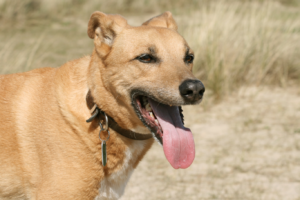The Goldendoodle is a “designer” dog breed that’s a cross between a Poodle and a Golden Retriever. They were initially bred in the late 1960s to be allergy-safe guide dogs. The Goldendoodles’ get their curly hair from their partial Poodle ancestry, which is considered to be hypoallergenic because it barely sheds. Goldendoodles also have sweet and calm temperaments like Golden Retrievers, making them great for guide dog work.
Goldendoodles currently come in three primary sizes: miniature, medium-sized, and standard. How big do Goldendoodles get? Miniature Goldendoodles typically weigh between 15 to 30 pounds, while medium-sized dogs weigh 30 to 45 pounds and standard Goldendoodles clock in at about 45 to 100 pounds. Goldendoodles are beloved for their cuddly, intelligent, patient, and people-pleasing nature. If you’re looking for an athletic dog that’s great with children, a Goldendoodle can be a fantastic companion.
Like all dog breeds, Goldendoodles have their own unique health profiles and dietary needs. In particular, they’re highly energetic dogs, which means they need a diet that will support that energy and athleticism.
Excited to learn more about your pup? In this guide, we’ll go over Goldendoodle health issues, nutrition, and diet, including the following:
- Goldendoodle Health Problems
- Goldendoodle Exercise Needs
- What Should I Feed My Goldendoodle?
- How Much to Feed a Goldendoodle Puppy?
- Create a Healthy Meal Plan for Your Goldendoodle Today
Goldendoodle Health Problems
Understanding your Goldendoodle’s susceptibility to different health problems can help you choose the best diet and lifestyle choices for them.
Hybrid breeds, like the Goldendoodle, can be more prone to genetic health problems inherited from their purebred parents. For example, both Golden Retrievers and Poodles can be prone to hip dysplasia, eye diseases, and Addison’s disease among other conditions. In addition, Goldendoodle health issues can vary greatly depending on your Goldendoodle’s size. For instance, larger Goldendoodles may be more prone to hip dysplasia or other diseases that typically afflict bigger dogs.
Here are some of the most common Goldendoodle health concerns:
- Hip dysplasia: Hip dysplasia is a condition that affects the hip during growth, leading to a deformed hip joint. Dogs with hip dysplasia may experience advanced arthritis, wobbliness, pain or weakness in the hind legs, or reluctance to climb stairs or run around. In some dogs, this can lead to lameness. Overweight dogs are at a higher risk of developing hip dysplasia or having more severe symptoms from hip dysplasia, which is why healthy portion sizes are critical for Goldendoodles.
- Aortic Stenosis: Aortic stenosis is a cardiovascular condition that affects many large dog breeds. Dogs with aortic stenosis are born with an aorta that’s too narrow, forcing the body to pump harder to get blood to the heart. Common symptoms of aortic stenosis include coughing, difficulty breathing, irregular heart rhythm, and, unfortunately, sudden death in some cases.
- Patellar Luxation: Patellar luxation occurs when a dog’s hip becomes dislocated regularly. This can result in pain and limping. Helping your dog maintain a healthy weight can help to reduce some of the symptoms of patellar luxation.
- Cataracts: Both Poodles and Golden Retrievers are prone to eye problems, which unfortunately, is the case with Goldendoodles who are susceptible to developing cataracts. Cataracts occur when your pup’s eye lens becomes cloudy or opaque, obscuring their vision. In some cases, a dog with cataracts may go blind.
Goldendoodle Exercise Needs
Goldendoodles are athletic dogs with lots of energy, which can lead their pet parents to ask, “How much exercise does a Goldendoodle need?”
Typically, Goldendoodles will need extensive exercise every single day…around two hours on average. Goldendoodles are also highly intelligent dogs, so they must be mentally stimulated daily. Mental stimulation can be built into their daily exercise by incorporating active puzzle toys, dog parks, obstacle courses, toys, and more.
Depending on how active your dog is, this can affect how much you should feed your dog. We recommend consulting with your pup’s veterinarian to better understand how much your Goldendoodle should be eating.
What Should I Feed My Goldendoodle?
So, what should I feed my Goldendoodle? Goldendoodles are highly active dogs that require high-quality protein sources and a well-balanced diet to stay healthy and happy.
Typically, it’s recommended that the best food for Goldendoodles includes the following:
- High-quality protein sources: Protein sources like beef, chicken, lamb, turkey, pork, and venison are crucial to support your dog during growth and development, as well as stimulate ongoing amino acid production. Amino acids are vital for building skin, tendons, ligaments, muscles, hair, and nails. High-quality protein is essential for healthy hormone production.
- Nutrient-rich ingredients: Nutritious ingredients, such as flaxseed, salmon oil, and liver, are important nutrients for your dog’s health in the short and long term. For example, salmon oil is excellent for keeping skin allergies at bay.
How Much Should I Feed My Goldendoodle?
So, how much should you feed your Goldendoodle? We always recommend consulting with your veterinarian about how much you should feed your pup. However, you can use the following Goldendoodle feeding chart as a guideline for how much to feed your Goldendoodle.
Tracking your Goldendoodle’s weight can also be a great way to ensure you are providing your Goldendoodle with enough food but not overdoing it. If your Goldendoodle is currently at a healthy weight and easily maintaining their weight, this is an excellent indicator that your pup is eating enough.
Consider the following general guidelines for feeding your Goldendoodle:
| Weight | Feeding amount per day |
| Miniature (15 to 30 pounds) | 1 to 2 cups |
| Medium (30 to 45 pounds) | 2 to 4 cups |
| Standard (45 to 100 pounds) | 3 to 5 cups |
*Please note that your dog’s age, life stage, and exercise levels will affect their daily caloric needs. We recommend consulting with your veterinarian to determine your pup’s ideal feeding amount.
How Much to Feed a Goldendoodle Puppy?
Goldendoodle puppies need to eat much more frequently than full-grown Goldendoodle adults. Puppies burn calories faster and are typically even more active, meaning that they may even need to eat more than an adult Goldendoodle. Speak with your veterinarian about the best dog food for Goldendoodle puppies and how often you should feed them.
Please keep in mind that puppies and adult dogs need to be fed at different frequencies. Puppies typically need to eat three-four times per day, ideally spaced evenly throughout the day. This could look like an early morning, noon, early evening, and late-night meal.
If you’re curious about what to feed a Goldendoodle puppy and how often, reference our Goldendoodle puppy feeding chart:
| Puppy’s age | Feeding Frequency | Daily feeding amount per day (Regular Goldendoodle) | Daily feeding amount per day (Miniature Goldendoodle) |
| 8 – 12 weeks | 3 to 4 times a day | Up to ⅔ cups | Up to ½ cups |
| 4 – 5 months | 3 times a day | 1.5 to 3 cups | ⅔ cups to 1 cup |
| 6 – 12 months | 2 times a day | 3 – 4 cups | 1 to 1.5 cups |
| 12 months + | 2 times a day | 4 – 5 cups | 1.5 to 2.5 cups |
Create a Healthy Meal Plan for Your Goldendoodle Today
So, how can you make sure that your Goldendoodle is eating high-quality, nutrient-dense food at the right amount?
PetPlate is an ideal meal plan created by a veterinary nutritionist and personalized to your dog’s breed, age, size, and more. With PetPlate, you’ll get 100% human-grade ingredients kettle-cooked in a USDA-approved kitchen, and the meals delivered right to your door! Our meals come in four delicious flavors that your dog will love!
Ready to give us a try? Tell us about your Goldendoodle, and we’ll put together a custom meal plan for them with optimal ingredients for supporting their long-term health. PetPlate meals even come pre-measured so that you can rest easy knowing that your pup isn’t overeating. Start today and discover the ease and convenience of yummy, nutrient-rich PetPlate meals.


